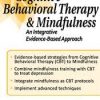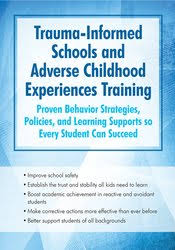Trauma-Informed Schools and Adverse Childhood Experiences Training – Christy W. Bryce | Available Now !
$219.00 Original price was: $219.00.$74.00Current price is: $74.00.
Trauma-Informed Schools and Adverse Childhood Experiences Training – Christy W. Bryce | INSTANTLY DOWNLOAD !
Salepage_https://catalog.pesi.com/item/50920/
Archive: https://archive.fo/wip/tYdrH
When you entered education, you thought it would be about lesson plans, curriculum, and seating charts.
You weren’t expecting kids who curse, hit, kick, and scratch other students, and bang their heads on the table when they’re frustrated. Kids who are constantly “in trouble” at school and have difficulty grasping the material being taught.
But sometimes the trauma of physical and sexual abuse, hunger, violence, and suicide lie behind these behaviors. And when you hear the stories of your students pain you’re left feeling blindsided, unprepared, and desperate for guidance on how you can help.
Whether you’re a teacher, administrator, counselor, social worker or anyone who works with students, this program will provide you with the step-by-step direction, tools, and techniques you need to work more capably and comfortably with kids who’ve experienced trauma. The strategies and comprehensive learning supports shared at this event will enable you to create a better school climate, boost academic achievement, and improve school safety while building critical skills in students like self-awareness, self-regulation, empathy, and an openness to teamwork and cooperation.
Sign up today, and get the trauma-sensitive skills and strategies you need to ensure every student can succeed!
- Characterize the relationship between Adverse Childhood Experiences (ACEs) and childhood development.
- Examine the role of Adverse Childhood Experiences and toxic stress on the escalation cycle and emotional dysregulation.
- Establish how emotional check-ins and strategies that encourage choice can create a more psychologically safe classroom.
- Communicate how trauma-sensitive practices can be employed to more effectively establish behavioral expectations and build structure and accountability.
- Specify how culturally responsive strategies can increase engagement in both students and their families.
- Articulate how a trauma-sensitive approach to discipline and corrective action can increase equity and replace reactive “push out” practices.
Get Trauma-Informed Schools and Adverse Childhood Experiences Training of author Christy W. Bryce
Adverse Childhood Experiences (ACES): The Hidden Public Health Emergency Affecting Schools
- The neurological and physiological impacts of toxic stress
- Trauma’s impact on kids’ development and futures
- Escalation cycle, toxic stress, and emotional dysregulation
Spot the Warning Signs of Trauma in Students
- How trauma impairs learning and impacts behavior
- How fight, flight, freeze looks in the classroom
- Physical symptoms to watch for
- Identify the “silent sufferer”
Trauma-Informed Practices for Schools and Classrooms: Establish Safety, Trust, Choice, Collaboration, and Empowerment
5 Ways to Build a Psychologically Safe Classroom
- Create calming areas in the classroom
- Build a classroom community
- Emotional check-ins, worksheets and activities
- How to offer choices so kids feel in control
- Schedules and routines that establish safety and normalcy
Challenging Behaviors Intervention Toolbox: Better Outcomes for Overreactive, Aggressive, and Avoidant Students
- What sets kids off? How to be a trigger detective
- Check in/check out for structure and accountability
- Better break interventions for avoidant students
- Executive functioning skills training for overreactive students
- Social stories to use when kids aren’t grasping expectations
Culturally Responsive Practices and Techniques: Support Sensitivity and Strengthen the School-Family Alliance
- Recognize our biases to better support cultural sensitivity
- Strategies for working with parents who’ve experienced trauma
- Strengthen the school-family alliance – support with families instead of to families
Trauma-Sensitive Approaches to Discipline and Corrective Action
- Building resilience – our kids can overcome!
- Leadership jobs that built competence and connectedness
- Discipline is a system: preventative, supportive, corrective
- Alternatives to suspension – keep kids in school and learning
Supports for Educators and Staff Who Experience Secondary Traumatic Stress
- Staff wellness – tap in/tap out
- Restorative circles for educators
Get Trauma-Informed Schools and Adverse Childhood Experiences Training of author Christy W. Bryce
1 review for Trauma-Informed Schools and Adverse Childhood Experiences Training – Christy W. Bryce | Available Now !
Add a review Cancel reply
Related products
Ecommerce
Ecommerce
NLP & Hypnosis
NLP & Hypnosis
Ecommerce
Ecommerce
Ecommerce
NLP & Hypnosis












Maren Fischer –
Awesome and great price!!!!!! | Trauma-Informed Schools and Adverse Childhood Experiences Training – Christy W. Bryce